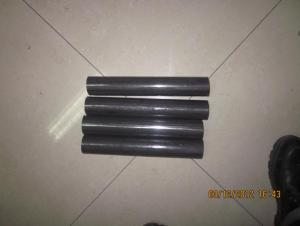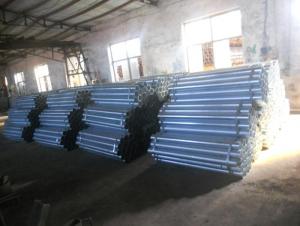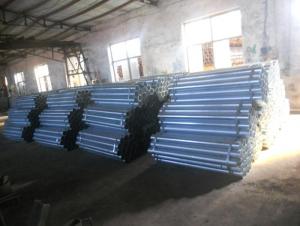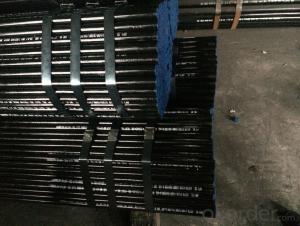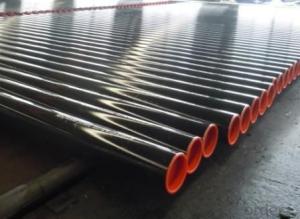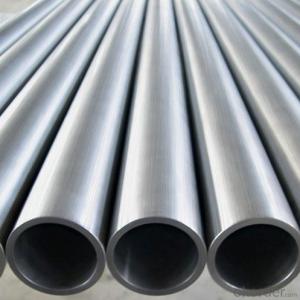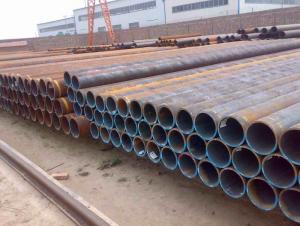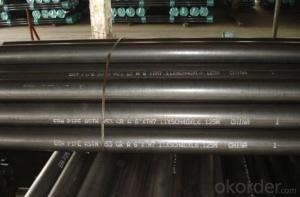ERW Welded Steel Pipes-Tube And Pipe API Spec 5L B, X42,X46,X52, X56, X60, X65 ASTM A53 1-1/2-20 For Oil Gas Fence
- Loading Port:
- China Main Port
- Payment Terms:
- TT or L/C
- Min Order Qty:
- 50MT m.t.
- Supply Capability:
- based on order m.t./month
OKorder Service Pledge
OKorder Financial Service
You Might Also Like
1. Specification of ERW Welded Steel Pipes-Tube And Pipe API Spec 5L B, X42,X46,X52, X56, X60, X65 ASTM A53 1-1/2-20 For Oil Gas Fence
1)Application/ Usage: It is widely applied to line pipe and casing and tubing in oil transportation and casing field, and it is used in Low,high pressure liquid and gassy transportation and it is also good Structure pipe (for furniture, window, door, building , bridge, mechanical etc.
2)Standard: API SPEC 5L, API SPEC 5CT, ASTM A53, GB/T9711.1
3)Steel Grade: API SPEC 5L: B, X42, X46, X52, X56, X60, X65; API SPEC 5CT: J55, K55, N80, L80; ASTMA53: A, B, C; GB/T9711.1:L242、L290、L320、L360、L390、L415、L450
2. Sizes of Pipes
Outer Diameter: 21.3-609.6mm
Wall Thickness: 1.8-18mm
Length: 5.8-15m
* Remark: Besides below sizes, we also can arrange production based on requirement of customers
3. Packing& Delivery
Package: bundles with anti-rust painting and with plastic caps
Delivery Time: Around 30 Days upon reception of prepayment or L/C
4. Data Sheet
Standard: ASTM A53
Mechanical Properties
|
Standard |
Grade |
(MPa) |
(MPa) |
|
Yield strength |
Tensile Strength | ||
|
ASTM A53M |
A |
205 |
330 |
|
B |
240 |
415 |
Chemical Composition(%)
|
Standard |
Grade |
C |
Mn |
P |
S |
V |
Ni |
Cu |
Cr |
Mo |
|
Max |
Max |
Max |
Max |
Max |
Max |
Max |
Max |
Max | ||
|
ASTM A53M |
A |
0.25 |
0.95 |
0.05 |
0.045 |
0.08 |
0.4 |
0.5 |
0.4 |
0.15 |
|
B |
0.30 |
1.20 |
0.05 |
0.045 |
0.08 |
0.4 |
0.5 |
0.4 |
0.15 |
5. Products Showroom
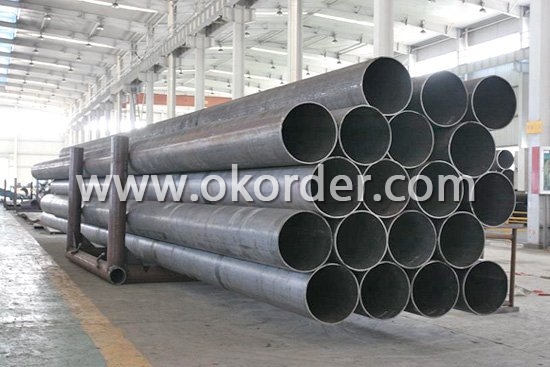
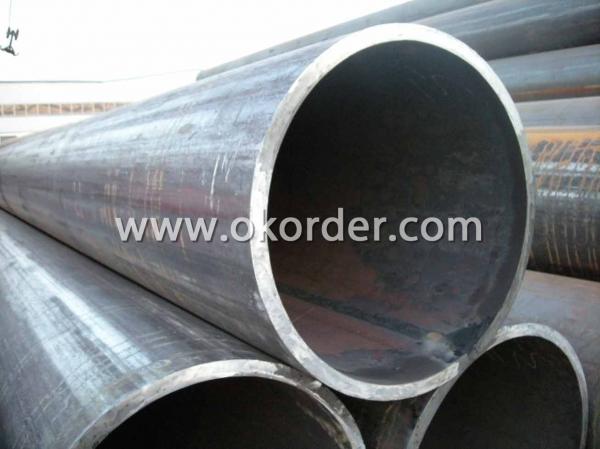
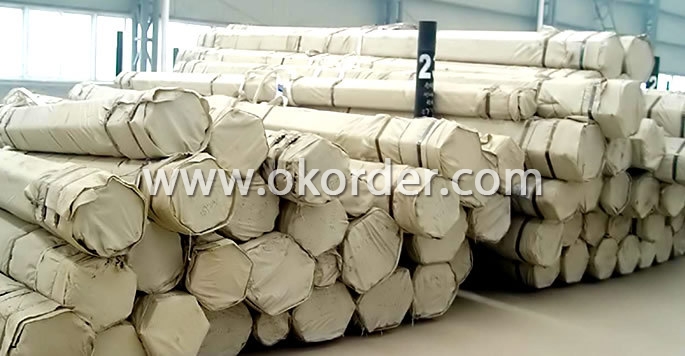
- Q: How to calculate the maximum bending stress of steel pipe? Is there a list of the maximum flexural normal stresses for steel pipes of different materials and diameters?
- The maximum flexural normal stress is calculated as: Sigma =M/ (gamma x*Wnx).Of which: M is the maximum bending moment of the steel tube;Gamma X - the plastic development coefficient of the cross section; for the cross section of the steel tube, 1.15,
- Q: How to perform nondestructive inspection of steel tubes
- Radiographic inspection (RT)One of the earliest nondestructive testing methods is widely used in the inspection of internal defects of metals and non-metallic materials and products, with a history of at least 50 years. It has incomparable unique advantages, that is to test the correctness, reliability and intuition of the defects, and the ray film can be used for the analysis of defects and as a quality certificate archive. But this method also has the disadvantages of more complicated equipment and higher cost, and should pay attention to the protection of radiation.
- Q: What are the different coatings applied to steel pipes?
- There are several different coatings that can be applied to steel pipes to enhance their corrosion resistance and durability. Some common coatings include epoxy coatings, polyethylene coatings, zinc coatings (galvanization), and polyurethane coatings. Each coating has its own specific benefits and is chosen based on the intended application and environmental conditions.
- Q: What is the role of steel pipes in the renewable energy sector?
- The transportation and distribution of various energy sources in the renewable energy sector heavily rely on steel pipes. An important application of steel pipes is seen in the construction of pipelines for transporting natural gas, which is increasingly being used as a cleaner alternative to traditional fossil fuels. Due to its strength, durability, and resistance to corrosion, steel is commonly chosen for these pipelines, ensuring the secure and efficient delivery of natural gas to power plants and other energy consumers. Furthermore, steel pipes are utilized in the installation of geothermal energy systems. Geothermal energy utilizes the heat from the earth's core to generate electricity or provide heating and cooling. Steel pipes are employed to create geothermal wells, allowing the extraction of hot water or steam from underground reservoirs. These pipes must withstand high temperatures and pressures, making steel an ideal material for this purpose. Additionally, hydraulic systems for hydroelectric power plants heavily rely on steel pipes. These power plants generate electricity using the force of flowing water, and steel pipes are used to convey water from the reservoir to the turbines. The durability and reliability of steel ensure the efficient transmission of water, enabling hydroelectric power plants to produce clean and renewable energy. In the construction of solar power plants, steel pipes also play a crucial role. Solar thermal systems concentrate sunlight to generate heat, which is then transferred to a fluid to produce steam and drive turbines. Steel pipes are essential for circulating and transferring this fluid, ensuring the effective operation of the solar power plant. In conclusion, steel pipes are indispensable in the renewable energy sector due to their strength, durability, and resistance to corrosion. They facilitate the transportation of natural gas, the extraction of geothermal energy, the transmission of water in hydroelectric power plants, and the circulation of fluids in solar power plants. By enabling the efficient distribution of various energy sources, steel pipes significantly contribute to the growth and sustainability of the renewable energy sector.
- Q: What is the difference between steel pipe and round steel?
- Making ring parts with steel tubes can improve data application rate, simplify manufacturing process, save data and work hours, such as rolling bearings, rings, Jack sleeves, etc., and have been widely used in steel pipe manufacture.
- Q: Can steel pipes be used for underground sewage treatment plants?
- Yes, steel pipes can be used for underground sewage treatment plants. Steel is a durable and strong material that can withstand the harsh conditions found underground, such as soil erosion and pressure. Additionally, steel pipes are resistant to corrosion, which is critical for sewage treatment plants where exposure to chemicals and wastewater is common.
- Q: What are the common methods for cleaning the inner surface of steel pipes?
- Cleaning the inner surface of steel pipes can be done using different methods. Some commonly used methods include: 1. Mechanical Cleaning: Debris, rust, or scale on the inner surface of the steel pipe can be physically removed using mechanical tools like wire brushes, scrapers, or abrasive pads. This method is effective for removing loose or loosely adhered contaminants. 2. Chemical Cleaning: Stubborn deposits, rust, or scale can be dissolved or loosened using acidic or alkaline solutions. These solutions are circulated through the pipe for a specific period, allowing the chemical to react and break down the contaminants. Chemical cleaning is used when mechanical cleaning is not enough. 3. High-Pressure Water Jetting: High-pressure water is directed through a nozzle into the steel pipe to remove debris, rust, or scale from the inner surface. The force of the water jet dislodges and flushes out the contaminants. This method is efficient for cleaning pipes with complex geometries or hard-to-reach areas. 4. Shot Blasting: High-speed abrasive particles are propelled against the inner surface of the steel pipe to remove rust, scale, or other contaminants. Shot blasting is commonly used for larger pipes or pipes with heavy deposits. It provides a thorough and uniform cleaning by removing the surface layer of the steel along with the contaminants. 5. Ultrasonic Cleaning: High-frequency sound waves are used to create microscopic bubbles in a cleaning solution. These bubbles implode upon contact with the inner surface of the steel pipe, effectively loosening and removing contaminants. Ultrasonic cleaning is particularly effective for cleaning small-diameter pipes or pipes with intricate details. It's important to consider factors such as the type and extent of contamination, pipe size and geometry, and desired level of cleanliness when choosing a cleaning method. Safety measures should always be taken to protect workers and maintain the integrity of the steel pipes.
- Q: Are steel pipes suitable for industrial applications?
- Yes, steel pipes are highly suitable for industrial applications. Steel pipes possess excellent strength, durability, and corrosion resistance, making them ideal for transporting fluids, gases, and solid materials in various industries such as oil and gas, construction, automotive, and manufacturing. Additionally, steel pipes can withstand high pressure, extreme temperatures, and harsh environmental conditions, making them reliable and efficient for industrial operations.
- Q: Are steel pipes suitable for underground nuclear waste storage?
- Yes, steel pipes are suitable for underground nuclear waste storage. Steel pipes are known for their durability, strength, and resistance to corrosion, making them an ideal choice for safely containing and transporting nuclear waste underground. Additionally, steel pipes can withstand the high pressures and temperatures associated with nuclear waste, ensuring the integrity of the storage system.
- Q: What is the role of steel pipes in the transportation of chemicals?
- The role of steel pipes in the transportation of chemicals is to provide a safe and reliable means of transporting various types of chemicals over long distances. Steel pipes are highly resistant to corrosion, which is crucial when dealing with corrosive chemicals. They are also strong and durable, ensuring that the pipes can withstand the pressure and weight of the chemicals being transported. Additionally, steel pipes are able to maintain the integrity of the chemicals, preventing any leakage or contamination during transportation. Overall, steel pipes play a vital role in ensuring the efficient and secure transportation of chemicals.
1. Manufacturer Overview
| Location | Tianjin, China |
| Year Established | 1997 |
| Annual Output Value | Above Three Million To Five Million RMB |
| Main Markets | Main land |
| Company Certifications | ISO 9001:2010;API 5L; |
2. Manufacturer Certificates
| a) Certification Name | |
| Range | |
| Reference | |
| Validity Period |
3. Manufacturer Capability
| a) Trade Capacity | |
| Nearest Port | Tianjin |
| Export Percentage | 40% - 50% |
| No.of Employees in Trade Department | 300-500 People |
| Language Spoken: | English; Chinese |
| b) Factory Information | |
| Factory Size: | 40,000 square meters |
| No. of Production Lines | Above 10 |
| Contract Manufacturing | OEM Service Offered; Design Service Offered |
| Product Price Range | Average |
Send your message to us
ERW Welded Steel Pipes-Tube And Pipe API Spec 5L B, X42,X46,X52, X56, X60, X65 ASTM A53 1-1/2-20 For Oil Gas Fence
- Loading Port:
- China Main Port
- Payment Terms:
- TT or L/C
- Min Order Qty:
- 50MT m.t.
- Supply Capability:
- based on order m.t./month
OKorder Service Pledge
OKorder Financial Service
Similar products
Hot products
Hot Searches
Related keywords
